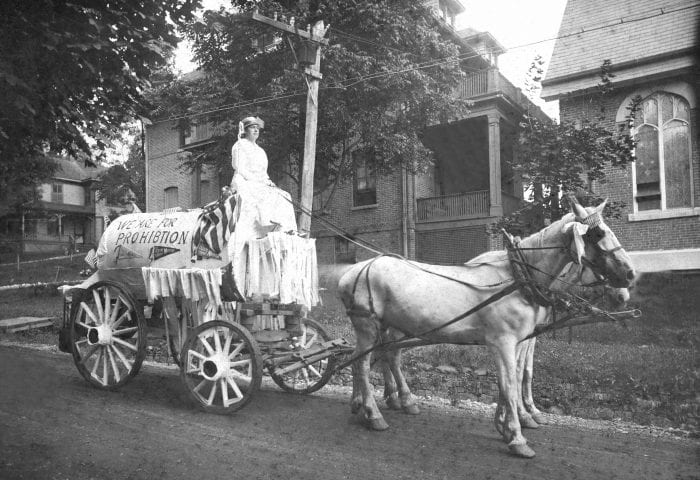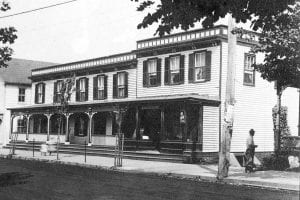Hometown History: The campaign for a bone-dry Port Jefferson

By Kenneth Brady
The campaign for a bone-dry Port Jefferson began during the 19th century. At the forefront of the movement, the Sons of Temperance was established in the village in 1848 and composed of members who pledged to abstain from drinking alcoholic beverages.
After the Sons disbanded in 1877, the Independent Order of Good Templars, Women’s Christian Temperance Union (WCTU), Young Men’s League and Prohibition Club were organized in Port Jefferson and continued the crusade against John Barleycorn.
The reformers sponsored debates, opened a mission on the village’s East Broadway and reported violations of the Sunday liquor laws. They also marched in parades, ran a temperance column in the Port Jefferson Echo, endorsed dry political candidates and organized rallies at Protestant churches.
The local activists joined lobbyists from the powerful Anti-Saloon League in supporting legislation that reduced the number of taverns in New York State. Retired sea captain Carman Howell of Port Jefferson served on Brookhaven Town’s 1917 Saloon Eliminating Committee that dramatically cut the number of taprooms in the area from 83 to 39.
In Port Jefferson, the committee members gave the prized liquor licenses to barkeeps William Thompson, Annie Russell, Arthur Decker, Catherine Barker, Thomas O’Rourke and Arthur Feltman, but not to Frederick Reep, Walter Davis and Martha Henschel.
Following the ratification of the 18th Amendment to the Constitution in 1919 and the passage of the Volstead Act later that year, Port Jefferson’s victorious drys turned their attention to enforcing the new laws against the manufacture, sale or transportation of intoxicating beverages.

In 1920, villagers organized a local chapter of the Allied Citizens of America. Arthur Loper, president, and Julia Bonelli, vice president, both prominent residents of Port Jefferson, led the newly formed division that worked for a bone-dry Northern Brookhaven and cooperated with law enforcement agencies in achieving that goal.
Thirty citizens, including respected villagers Ralph Dayton, Thaddeus Oettinger, George Darling and Roscoe Craft organized a Public Safety Committee, charged with investigating and correcting any of Port Jefferson’s moral or social ills.
Rev. John J. Macdonald, pastor of the Port Jefferson Presbyterian Church, was elected president of the Citizens’ League of Suffolk County, a vigilance committee comprised of ministers and laymen. They promised a relentless war against the bootleggers and rumrunners operating along the north shore of Long Island from Orient Point to Port Jefferson.
William Anderson, former superintendent of the Anti-Saloon League, addressed the congregation of the Port Jefferson Methodist Church. Well known throughout New York as the “bartender’s nightmare,” Anderson discussed “A Patriotic Protestant Protective Alliance Necessary for the Preservation of Prohibition.”
Dr. Oscar Haywood, a lecturer for the Ku Klux Klan, spoke at the Port Jefferson Baptist Church in 1924 and Athena Hall (Theatre Three) in 1925. Among its goals, the Suffolk County Klan called for strict enforcement of the 18th Amendment.
Although facing considerable pressure to obey the dry laws, some villagers still flouted the Volstead Act. The proprietors of Barker’s Hotel (Main Street), the American House (East Broadway), and Bennett’s Restaurant (Main Street) were all arrested for serving hooch.
William Thompson, who ran the Ardencraig Bowling Alleys and Billiard Parlor (Arden Place), was twice convicted and fined for selling whiskey to shell-shocked veterans from the Vocational Training Institute at the Plant Hotel, now the site of Port Jefferson High School.
The authorities raided the Sundodgers, a private social club on upper Thompson Street, and dumped 16 cases of home-brew in the backyard. Federal agents also nabbed a man for distributing moonshine from his house on Liberty Avenue.
Customs inspectors boarded the Dragon when it docked in Port Jefferson, took the yacht’s cargo of gin and arrested the crew. Following a high-speed chase off Port Jefferson, a government patrol boat captured the Porpoise and seized its stash of contraband whiskey. The notorious Artemis was discovered in a Port Jefferson shipyard where she had been secretly towed for repairs. The rumrunner had been hit by gunfire in a furious battle with a Coast Guard cutter off Orient Point.
The majority of Port Jefferson’s residents soon tired of Prohibition and the problems that the dry crusade had engendered. Although the Prohibition Emergency Committee campaigned in the village to keep the Eighteenth Amendment intact, it was repealed by the states on Dec. 5, 1933. In each of the three election districts that then formed Port Jefferson, voters opposed to Prohibition prevailed.
As wets celebrated their victory, dry’s met in the Port Jefferson Baptist Church and bemoaned their defeat. Bars and package stores quickly reopened in the village. The “noble experiment” had ended.
Kenneth Brady has served as the Port Jefferson Village Historian and president of the Port Jefferson Conservancy, as well as on the boards of the Suffolk County Historical Society, Greater Port Jefferson Arts Council and Port Jefferson Historical Society. He is a longtime resident of Port Jefferson.






